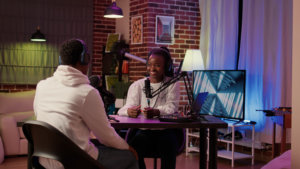Podcast Guest Etiquette, According to the Experts
Being a podcast guest is a huge honor and opportunity. But even the smartest, funniest, and most interesting guests can do the things that get on podcast hosts’ nerves. To find out what to avoid and what to embrace, we reached out to podcast hosts, podcast strategists, and Podchaser insiders for their top podcast guest etiquette tips.
Table of Contents
- Meet Our Podcast Guest Etiquette Experts
- Learn About the Podcast, Host, and Topics
- Listen to Two or More Episodes for Interview Structure
- Set Up Your Recording Space
- Get Good Audio Quality
- Master the Art of Podcast Timing
- Be an Active Listener
- Don’t Be Too Salesy
- Make It Flow Naturally
- Final Thoughts on Podcast Guest Etiquette
Podcasting has come a long way since Adam Curry launched the first podcast in 2004. Nowadays, there are serious dos and don’ts when appearing on a podcast. Plus, some helpful tips to help you go from one-timer to a guest who’s in demand.
So keep reading to learn how to turn a podcast guest appearance into an ongoing thing.
Meet Our Podcast Etiquette Experts
- Oberon Copeland, Founder & CEO of Very Informed
- Harry Morton, Lower Street Founder
- Eric Silver, Head of creative at Multitude and also co-hosts Join the Party and Games and Feelings
- Michael Bickett, Sales Development/Customer Success at Podchaser, Podcaster, and GUI Media Network Founder
- Cristina (Marz) Marcello, Audio Engineer, Executive Producer – Robert Manni Radio, Associate Producer – Inside the Vault
- Thomas Hawkins, Electrician Apprentice HQ, CEO
- Ronald Williams, podcast host, and the founder of Best People Finder
- Brett Robinson, Head of Content and Marketing for Wired Clip
- Kathryn Read, International Sales and Marketing Consultant
Learn About the Podcast, Host, and Topics
Before you go on a podcast:
- Get to know the host.
- Dig into the podcast’s topics.
“In guesting a podcast, preparation is key. First, you need to make sure that you understand the topics. It’s also a good idea to have a few talking points prepared in advance to start strongly when the interview starts. It’s important to be respectful of the host’s time and to keep your answers concise,” say Oberon Copeland.
The last thing you want to do is show up unprepared.
Likewise, pronounce your host’s name perfectly. Practice saying their name before your interview, especially if you’re struggling or nervous.
Also, it doesn’t hurt to ask if they have a nickname they prefer.
Listen to Two or More Episodes for Interview Structure
Take time to understand the podcast you’re guesting on. Ask the host questions before the interview so you can bring your A-game.
After all, the host took a lot of time organizing the show and reaching out to you. So respect the effort and do your part to make your interview a smash hit.
“Listening to a couple of the episodes of the podcast that you’re about to be a guest on isn’t too much to ask for. [However,] when guests show up unprepared and haven’t really understood the premise of the podcast, it derails the entire structure and script—something that your listeners will be quick to catch up on,” says Harry Morton, Founder at Lower Street.
What to do instead:
- How is the podcast structured?
- What questions will the host likely ask?
- Learn about the host/company.
- Get a sense of the mood and audience the podcast is reaching.
“Nothing makes me happier than if my guest knows my show and comes in already understanding the vibe,” says Eric Silver, Head of Creative at Multitude and co-host of Join the Party and Games and Feelings.
Set Up Your Recording Space

Setting up a recording space is essential because the success of your show depends on an exceptional performance.
You don’t need a high-tech studio with tens of thousands of dollars worth of podcasting equipment. But, of course, you might have that set up one day. But, until then, your needs are much more straightforward.
You might be thinking: I have an empty guest room or a quiet nook that could work.
But that’s not always true.
Empty rooms aren’t always the best because they can create echoes, resulting in subpar recordings.
“The basic aim is to be in a room with minimal echo and background noise. Even podcast pros and voiceover artists sometimes record in their closets, so the clothes work as a sound treatment. You want a mic that picks up sound from a limited space or specific direction to cut down on echo for untreated spaces. Dynamic mics like the Shure SM7B or MV7 will work best in untreated spaces because they will only pick up sounds from a limited area,” says Michael Bickett.
What to do instead:
Record in any room in your house if you don’t have the funds to build your studio from scratch (most podcasters don’t, especially at the beginning).
Consider spaces with many soft surfaces, such as carpets, rugs, and fabric furniture. Avoid spaces with hard surfaces, such as your kitchen or rooms with hard flooring.
For example, if anything drops on a hard surface while recording, it’ll make a disturbing sound in the audio output, especially if close to the microphone.
“Close windows. The room should be quiet. Best to be in a room with a lot of “stuff” that can absorb any ambient room noise, planes, etc.,” adds Cristina Marcello.
See our article on how to set up a podcast studio that costs only $176.
Get Good Audio Quality

Listeners enjoy quality audio. The host might only publish the episode if the audio quality is good. For audio output to work well, here’s what you’ll need:
Your Headphones
Was there a time you joined a Zoom meeting but forgot to use headphones or turn down the volume of your speakers? As a result, you most likely heard an echo, resulting in a poor recording.
When you’re a podcast guest, you need to hear the post. But when you use your computer speaker, its microphone picks up the subtlest sounds and creates an echo.
You can solve this problem with headphones. See the best podcast headphones here.
Your Microphone

“Investing in a decent microphone will instantly enhance the experience and ensure that your voice is audible, crisp, and clear. So there won’t be a mismatch between the audio quality between you and the podcast host,” says Harry Morton.
If you’re a regular guest speaker, you may have a microphone already. If otherwise, getting one is easy. It won’t cost you much to get a good microphone.
Also, most Apple EarPods and Bluetooth headsets come with an in-built mic. Are they better than using a built-in computer microphone for voice recording? Yes! Are they enough to produce a decent voice recording? Yes.
“Podcast guests often have crappy audio, which affects the success of the podcast itself. This isn’t that hard to figure out, yet we encounter it often. A solid mic and a pre-test are pretty much all you need to do to get around this issue,” says Thomas Hawkins, CEO of Electrician Apprentice.
Your Recording Platform
Getting your headphones and microphone set up is one part of the equation. Sending a quality audio file to your host is another.
For instance, Eric Silver said, “I’ve had to trash whole episodes or do a ton of audio repair because the audio was unusable.”
What to do instead:
Free and paid recording and editing platforms are available depending on your budget and goals.
Master the Art of Podcast Timing
First, ask your host how long the interview will take. You want to talk for less than 20 minutes when the podcast will span an hour and vice versa. And, if you have a limited time, focus on the key points.
If your host provided you with questions, take your time to read through them. Thinking about your answers and practicing them beforehand will iron wrinkles in your speech.
“Always ask how long the recording is. I guested on a podcast once when I learned 90 minutes that we would record for three hours. I made up a fake emergency (something like “my girlfriend is sick and needs my help, sorry!”, because it was too much. From then on, I always ask how long the recordings are going to go.” Eric is head of creative at Multitude and co-hosts Join the Party and Games and Feelings.
Be an Active Listener

Active listening means paying attention. Besides giving full attention to the speaker, you must appear to be listening—otherwise, the speaker may think the topic is a snooze fest for you.
“There’s nothing more frustrating or annoying than a podcast guest who interrupts or talks and doesn’t focus on listening to the host. It is fine that, as a guest, you’re expected to share your knowledge before your time with your host is up. But it is no excuse for not listening to the question being answered. You need to hear everything your host is saying to answer the topic. By listening, you’ll be able to share that insightful knowledge exclusive to you,” says Ronald Williams.
What to do instead:
- Be attentive. Take out anything that can distract you. Why is the host telling you this? What is the takeaway from the conversation? Don’t answer yet—Concentrate on what they want you to hear.
- Show you’re listening. It is easy for the speaker to tell if you are paying attention. Make eye contact, nod, and say “yes” or “huh.” Avoid interrupting—it may derail the conversation.
- Provide feedback. Whenever the opportunity presents itself, provide insightful feedback. You could do this by sharing your opinions and asking follow-up questions.
- Don’t draw conclusions too quickly! No one is a mind reader. If you need clarification about something, ask for more information.
- Give them the chance to rephrase or clarify. For instance, say, “I want to clarify what you meant by X.” In this way, you avoid making a mistake by giving them a chance to clarify or rephrase.
Don’t Be Too Salesy

No one wants to be marketed to.
“Even if you have an agreement with the podcast host beforehand that you can promote certain things during the episode, make sure that it doesn’t dominate the conversation (unless the podcast host starts it),” Brett Robinson says.
A critical piece of podcast guest etiquette is remembering you are a guest, not the host. Your host sets the rules and structure of the episode.
What to do instead:
Focus on providing value. If you just focus on selling your product or service, you’ll fail to connect with the podcast’s audience.
Not only does that make the episode boring, but it also makes listeners tune out your message.
Make It Flow Naturally

As a podcast guest, confirm the chemistry is right – flow with the conversation naturally. If you feel like laughing, laugh. Even if you have notes, audiences can tell you’re reading a script instead of speaking.
“I don’t like it when guests read their answers to the questions I proposed in advance. It’s much more successful when the discussion flows naturally. So, yes, I prepare some questions in advance as a fallback, but they shouldn’t be the only points discussed,” Kathryn Read says.
Final Thoughts on Podcast Guest Etiquette
Build your brand, share your knowledge, and connect with audiences as a podcast guest. And don’t forget to follow these expert podcast guest etiquette tips to create a compelling episode.
With Statista predicting podcast listeners to reach 504.9 million by 2024, taking advantage of this audio marketing channel will help you reach new audiences. Even so, you may need a professional to guide you.
Learn More About Being A Podcast Guest
Now that you know the essentials of podcast guest etiquette, it’s time to go deeper.
Here are a few articles to get you going:
Unlock more with Podchaser Pro
- Audience Insights
- Contact Information
- Demographics
- Charts
- Sponsor History
- and More!

- Account
- Register
- Log In
- Find Friends
- Resources
- Help Center
- Blog
- API
Podchaser is the ultimate destination for podcast data, search, and discovery. Learn More
- © 2024 Podchaser, Inc.
- Privacy Policy
- Terms of Service
- Contact Us